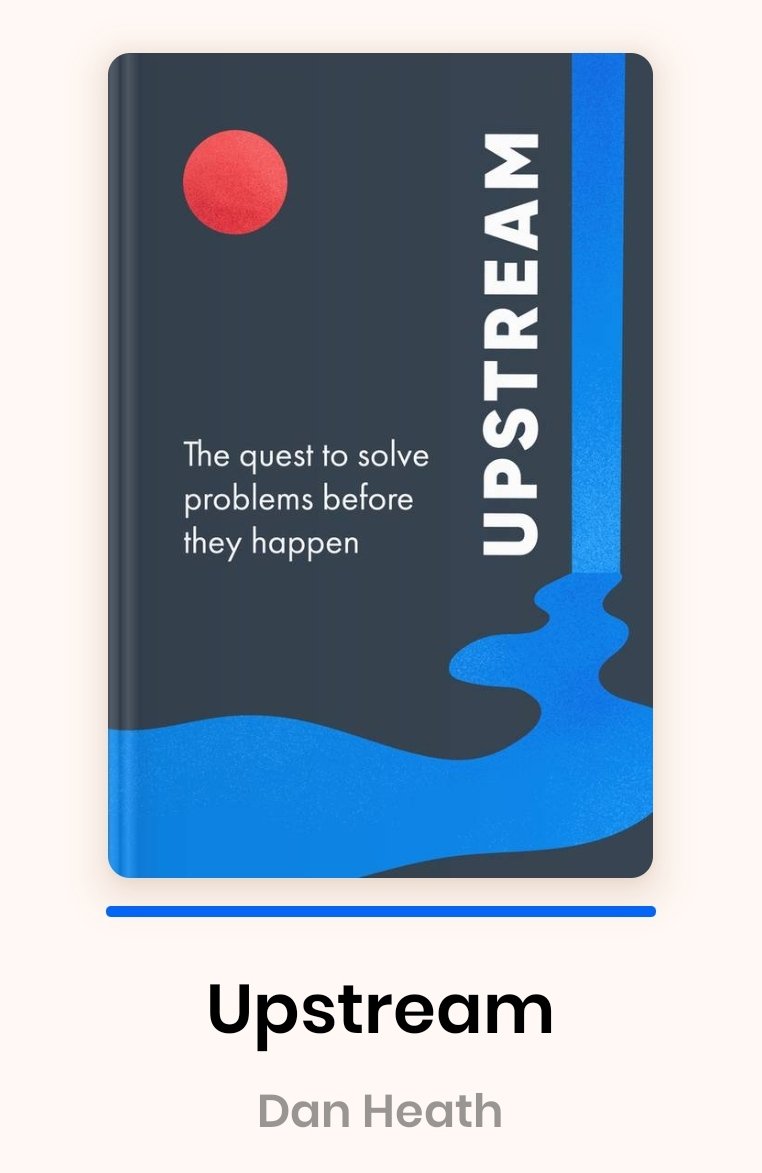> In order to solve a problem, you must first find the source; otherwise, more problems will simply continue to sprout.
>Upstream thinking requires one to act in a preventive rather than reactive manner.
>When the source is dealt with, there will no longer be any dangerous offshoots.
>It is much better to spend time thinking of possible problems and solving them before they occur.
>You don’t wait for bad things to happen, Instead, you look for the signal that there’s a risk there, and then you act on it. Because if you wait for the bad things to happen, you can never quite put things back together the way they were before.
>Upstream work is chosen, not demanded.
>If work is not chosen by someone, the underlying problem won’t get solved. This lack of ownership is a major force that keeps us downstream.
>People who tunnel can not engage in systems thinking; they can’t prevent problems, they just react.
>There is no long term planning; no strategic prioritization of issues, and this is what causes tunneling to be a barrier to upstream thinking.
>Tunneling is also said to be caused by the scarcity of time, the pressure and overwhelming feeling of having so much to do with so little time would easily force a person to tunnel; opportunity cost, to choose a few of the most pressing things at the expense of the others.
>Scarcity and Tunneling in particular, leads you to put off important but not urgent things.
>And of course we never run out of urgent things to do, so then all of a sudden, we’re 70 years old without a will.
>When we can foresee a problem, we leave more maneuvering room to fix it.
>One key factor is the great prevalence of false positives: warnings that incorrectly signal trouble.
Have you ever rolled your eyes when you heard a fire alarm?
That’s called alarm fatigue. And it is a critical problem.
Have you ever rolled your eyes when you heard a fire alarm?
That’s called alarm fatigue. And it is a critical problem.
>Our comfort with false positives hinges on the relative cost of handling false positives versus the possibility of missing a real problem.
>Chicken Little Problem: Distant and improbable threats
What if, for certain kinds of problems, being “prepared” simply isn’t good enough? What if avoiding a problem requires perfection? This is the Chicken Little Problem.
What if, for certain kinds of problems, being “prepared” simply isn’t good enough? What if avoiding a problem requires perfection? This is the Chicken Little Problem.
>Should this thing be invented? If it can be invented, it will be. Curiosity and ambition and competitiveness push them forward, forward, forward. When it comes to innovation, there’s an accelerator but no brake.
>“The prophet’s dilemma” concept: a prediction that prevents what it predicts from happening. It is a self-defeating prediction.
>The spirit of upstream thinking deals with having forethought to prevent problems before they happen, and even when they happen and we can’t stop them entirely, we blunt their impact.
>Be impatient for action but patient for outcomes
>The world is full of groups who engage in lofty discussions and feel virtuous doing so but never create meaningful change
>Change cannot come without action. But then, at the same time, it can take a while for that action to bear fruit.
>Downstream work is narrow and fast, Upstream work is broad and slow.
>The macro starts with the micro: When one thinks about big problems, we are forced to grapple with big numbers.
>You can’t help a thousand people or a million until you understand how to help one.
>Many upstream efforts and works are a kind of volunteer work, it is chosen, not obligated.
>Make a list of probable sources when you come across a problem and check each one to find where the problem is coming from. This elimination method can help you reduce the time spent trying to find the root of a problem.

 Read on Twitter
Read on Twitter


